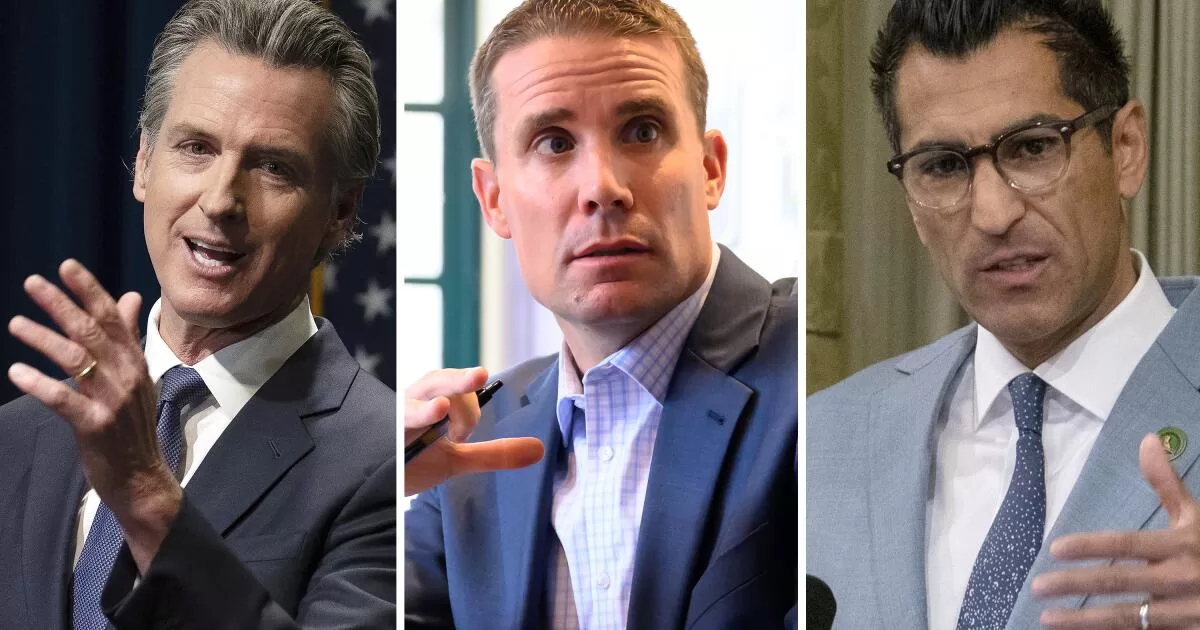Using a baseball tactic that former college ballplayer Gavin Newsom should understand, the Legislature has started throwing brushback pitches at the lame duck governor.
The batter has been leaning in too close and crowding the legislators’ plate. And the legislative leaders have been brushing him back with inside heaters.
In everyday lingo, they’ve been brushing him off. At least temporarily, trying to discourage California’s chief executive from stepping too far onto their turf.
The latest and most dramatic example is what happened recently at the close of the Legislature’s two-year session.
As is Newsom’s habit — one that has increasingly annoyed lawmakers — the governor waited until the last minute to propose major legislation. He contended his measure would avoid spikes in gasoline prices by imposing petroleum reserve requirements on oil refineries.
“These price spikes are actually profit spikes for Big Oil,” he asserted.
But Newsom’s proposal was controversial and complicated — so complex that fellow Democrats in the Assembly complained there wasn’t enough time left in the session to thoroughly examine the issue. Speaker Robert Rivas (D-Hollister) refused to even consider the governor’s proposal. A brushback pitch.
So, on Saturday night as this Legislature was about to knock off until a newly elected one convenes in December, Newsom carried out a previous threat and called the lawmakers back into special session to act on his proposal.
But in an unprecedented uprising, the Senate stood up to the governor and refused to convene a special session. Democrats could have passed the bill during the regular session and an overtime session was unnecessary, Senate leader Mike McGuire (D-Healdsburg) said. See you in December.
That was a blazing McGuire brushback pitch.
But the Senate leader has backed off since then.
He now says he’ll convene his house in a special session — but only on one condition: that the Assembly first agrees on a bill and sends it to the Senate. He won’t ask senators to sit around Sacramento while the Assembly holds public hearings and negotiates with itself, McGuire told me.
“This issue has never been about simply convening. It’s about lining up the votes,” he said. “The Senate had the votes. The Assembly didn’t have the votes. The solution to all of this is finding a majority of Assembly members to support the bill. And the Assembly has work to do.
“If they get the votes, I’ll immediately take it to our senators for discussion. Our [Democratic] caucus is 100% unified at this point about not immediately convening.”
What caused McGuire to soften his adamant opposition to a special session?
“The governor and I had a productive meeting and talked about a path forward,” he replied.
Newsom, of course, also has many potential brushback pitches in his arsenal. He has hundreds of bills stacked on his desk to be signed or vetoed by Sept. 30. Rewarding allies and punishing opponents is basic politics.
Anyway, it’s questionable whether the Senate could legally rebuff the governor’s call for a special session. It’s a separate and equal branch of government. But the state Constitution gives the governor on “extraordinary occasions” the right to “cause the Legislature to assemble in special session.”
That power has never been tested in court. And there’s no punishment for telling the governor to shove off.
“My reading of the Constitution is that the Legislature has to convene, but it’s up to them when,” says Chris Micheli, a law professor and lobbyist. “It’s up to them whether they vote. They could immediately adjourn and be done with it, and say, ‘We’ve convened, thank you.’”
Rivas told me he’d like to commence public hearings on a bill within a few days and hopes to pass legislation by the end of September. But don’t be surprised if this drags into October.
The speaker has created a huge 19-member Petroleum and Gasoline Supply Committee — encompassing roughly one-fourth of the Assembly — to hold public hearings and consider the legislation.
Newsom wants to give the California Energy Commission the power to require refiners to stockpile a stable fuel reserve to prevent shortages and price spikes when equipment is shut down for maintenance. Supply and demand determine price. That’s basic free market economics.
But opponents and skeptics — not just the oil industry, but also some moderate Democratic Assembly members — argue that the proposed cure itself could create temporary price spikes because gasoline would be removed from the supply chain and held in reserve.
Rivas himself isn’t yet convinced of the bill’s merit, I’m told.
Neither the speaker nor the Senate leader wanted to harshly criticize the Democratic governor publicly.
But privately, many of their Democratic colleagues are fed up with Newsom’s deadline-pressing game playing, especially after he has spent significant time traveling across the country enhancing his national political profile. They think he should focus more on the California Capitol, working directly with lawmakers on matters he deems important.
“Anything worth doing takes time and an investment in relationships — and in getting proposals across the finish line,” McGuire told me when I asked whether Newsom should have moved sooner to promote his refinery legislation.
“Candidly, we’re all Democrats. We need to work together.”
Rivas said that when Newsom urged him to rush through the bill “without public hearings or discussion, I was very candid and told him it wasn’t going to work for me and it wasn’t going to work for the Assembly.”
Newsom could — and should — have begun dealing with the Legislature on his proposal in January. His last-minute antics have gotten old and unproductive.
His season ends in 28 months. He’d better start hitting the ball better. Learn from the brushback pitches.
